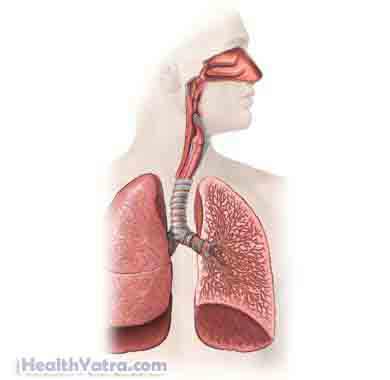Definition
Pneumocystis pneumonia (PCP) is a form of pneumonia. It affects people who have a weakened immune system. PCP is the most common serious infection among people with AIDS.

Causes
PCP is caused by a fungus. Most believe that the fungus is spread in the air but it is not clear if the fungus lives in soil or elsewhere. In healthy people, the fungus can exist in the lungs without causing pneumonia. However, in people who have a weakened immune system, the fungus can spread and cause a lung infection.
Risk Factors
A weakened immune system can put you at risk for PCP. The immune system may be weakened in people who:
- Have AIDS
- Have cancer
- Are getting treatment for cancer
- Are using medications that may weaken the immune system such as steroids
Symptoms
Symptoms of PCP usually develop over the course of a few weeks or months. The main symptoms of PCP are:
- Shortness of breath
- Fever
- Dry cough
- Tightness or pain in the chest
- Weakness
See your doctor immediately if you have any these symptoms.
Diagnosis
Your doctor will ask about your symptoms and medical history. To confirm PCP, a sample of mucus from your lungs will be examined under the microscope. Your doctor will collect samples by giving you either:
- A vapor treatment to make you cough
- A bronchoscopy —an instrument is inserted into your airway
Treatment
If you get PCP, your treatment will depend on how serious the infection is. If you have a mild case, you will be given medication in pill form. If you have a severe case, you will probably be treated in the hospital. Medication will be given by IV to treat PCP and other supportive treatments may be needed to help you breathe.
Even when treatment is given for PCP, the death rate is 15% to 20%. It’s best to avoid getting PCP in the first place.
Prevention
PCP infections can cause damage to your lungs and affect your overall health. Preventing a PCP infection is an important first step. A healthy immune system is the best prevention for PCP. See your doctor as recommended to help monitor your immune system. If you have HIV, follow your treatment program to keep your immune system healthy. This will help prevent a PCP infection.
If you are at risk for PCP, your doctor may recommend that you take medicine to prevent getting it. Take preventative medication as recommended, do not skip doses. PCP prevention with medication may be recommended if:
- You have HIV and your CD4 cell count falls below 200.
- You plan to use immune suppressing medications for a long period of time.
- You have other conditions such as a temperature above 100˚F that lasts for more than two weeks, or a fungal infection in your mouth or throat.
You may have heard of a pneumonia vaccine. This only protects you from a different kind of pneumonia. It will not prevent you from getting PCP.
